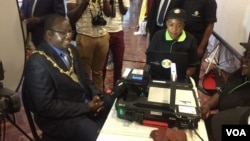Zimbabwe on Thursday officially kicked off its election registration process, though no election date has been set.
President Robert Mugabe was among the first to register with the newly acquired Biometric Voter Registration kits or BVR, together with his wife, Grace, and other officials, in full view of the media at his residence.
“On the advice of the Zimbabwe Electoral Commission, I duly proclaimed today as the first day upon which the biometric voter registration will officially commence."
This is the first time Zimbabwe is using the BVR kits, provided by a Chinese company Laxton Group Limited. The country is expected to receive a total of 3,000 kits by the end of the year, in preparation for the elections scheduled sometime in 2018.
President Mugabe said his government was fulfilling its mandate by making the kits, funded by the United Nations Development Agency (UNDP), available.
“As government we stand guided by our constitution and ZEC (Zimbabwe Electoral Commission) on how elections are to be run in this country. The constitution of Zimbabwe enjoins the government to play a facilitating role in terms of resourcing and protecting the independence, and partiality and integrity of such institution.”
Despite allegations by the opposition and other civil society groups that the voter registration process lacks transparency, and that Thursday’s kick off was illegal, the head of the Zimbabwe Electoral Commission, Justice Rita Makarau, says they’ve been open to the public about the proceedings. She assured President Mugabe that her organization is ready to conduct the election, though only 400 of the expected 3,000 kits are in the country.
“We would not have sought your advice to issue the proclamation if we were not ready. Again, we are ready financially, we have the resources, our people have been trained on how to use the kits, and they are ready to register all Zimbabweans at the 63-district offices that I have mentioned.”
Opposition parties have refuted her claims amid allegations that the process is fraudulent. They also argue that Zimbabwe has not secured the servers needed to store the collected voters’ information, adding that this may be tempered with resulting in the conduction of fraudulent elections next year.
The opposition has noted that children turning 18 after January 15 next year won’t be able to vote in the next elections as the voters’ roll will be closed for the elections expected to be conducted in July 2017.
The opposition party Movement for Democratic Change led by former Prime Minister Morgan Tsvangirai, is challenging the proclamation in court.
The Zimbabwe Electoral Commission is expected in the next four months to register at least 7 million voters using a new system widely criticized by opposition parties and some stakeholders.




